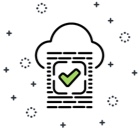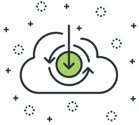With more and more companies migrating their operations and data to the cloud, cloud security has become a hot topic of conversation. Security is usually one of the first concerns businesses have when looking to move all or part of their operations to the cloud.
Business owners might be concerned about the safety of their website, and they also may worry that hosting their application data in the cloud might make their business vulnerable to cyber-attacks. All these are valid concerns, but when done right, cloud security provides multiple levels of control within the network infrastructure to offer continuous protection for assets such as data, websites, and web applications.
Cloud hosting represents a huge shift from the traditional way companies look at IT resources. Cloud migration and the endless options available for hosting websites and application data can be overwhelming for companies new to the cloud, but the reality is that it brings multiple security advantages.

Protecting against DDoS
DDoS attacks have continued to grow in frequency in recent years, and businesses generally spend a lot of resources and time to combat them. Working in the cloud comes with the added advantage of protecting servers against DDoS attacks.
There are multiple ways to protect servers against a DDoS attack, with the most basic one being to discard the traffic sent to the server that has been targeted. This is also known as “blackholing”. While it does unclog the network, it leads to the loss of legitimate and malicious content. Another way to protect the servers is to scrub the data, which means looking at data before it reaches the targeted server. This is a way to discard malicious traffic with the help of an algorithm, but the downside is being limited by the bandwidth of the scrubbing center.
When using cloud DDoS protection, the attacking traffic is scrubbed near the source, as the cloud DDoS protection uses multiple global scrubbing centers. This way, the attacking traffic doesn’t get near the targeted server. By scrubbing data near the source, this solution prevents the rest of the network from becoming congested during a malicious attack.

Data Security
Data security and integrity are crucial components of cloud security, ensuring that data remains stored where it was originally uploaded and preventing unauthorized modification and deletion.
In an era where data breaches are becoming more common, quality cloud computing security solutions have multiple security protocols in place in order to protect transactions and sensitive information. These protocols prevent third parties from accessing or tampering with the data in the cloud. Most cloud solutions monitor and audit all data activity regularly and enforce security policies in real time.
A report from RapidScale showed that 94% of businesses saw their security improved after switching to the cloud. And investing in cloud mobility and security often translates in increased revenue growth, with Dell claiming that companies who do this grow up to 53% faster than their competitors.

Regulatory Compliance
Choosing a top cloud computing security solution makes it easy to protect personal and financial data and make sure it complies with current regulations. Companies that have sensitive data stored in the cloud need to pay close attention to regulatory compliance and make sure they obey the laws, regulations, and guidelines that are specific to their business. Amazon Web Services offers a beneficial security and compliance tool, AWS Artifact. This service gives AWS customers access to security and compliance reports along with AWS security and compliance certifications.
Security is the most important step to take in the direction of regulatory compliance, and storing data in the cloud usually makes it very easy to achieve a good level of security and compliance, which is often better than the ones that were achieved before migrating to the cloud.

Fault Tolerance
The cloud is a network of servers stored in secure, highly protected data centers. Since these computers are all connected, your application is unlikely to experience downtime because if a server goes down, another one will pick the application right up.
Companies that are interested in using fault-tolerant systems can take advantage of the ability of cloud systems to continue operating without interruption even if one or more servers or components fail. Working in the cloud offers companies the continuity they need to maintain essential functions in the event of a disaster.

User Access
When working in the cloud, companies have numerous options for setting up permissions for their users. This means that it’s easy to make sure each employee has the correct permissions for their level and also that end users can only access certain things.
Top cloud solutions make it easy to manage user permissions and restrictions with a high level of automation and minimum fuss. As such, users only get access to what they need to do their job, and admins can easily grant extra permissions as needed. Data security remains the same regardless of how many users have access.

System Updates
Unlike in the case of in-house servers, all the updates and upgrades are able to be performed automatically when companies use the cloud. This is a huge benefit because it saves time and effort for IT teams, reducing the workload or allowing team members to focus on more important tasks.
All updates and upgrades are done by the service providers, off-sight, which is convenient for staff with busy schedules. According to an infographic published by PC World, half of the cloud adopters mentioned that they required fewer internal IT resources as a benefit.

Loss Prevention
Companies that don’t use cloud-computing solutions have their valuable data tied to the physical location the computers reside in. In many cases, this is not an issue, but there is always a chance you may end up losing data permanently if something happens to the local hardware.
While this might sound far-fetched for many, in reality, computers can malfunction for various reasons, ranging from age-related hardware deterioration, to viral infections and simple user error (losing laptops with valuable data on them as a result of misplacing them or being stolen is more common than you think).
Saving data locally is less secure than working on the cloud. By choosing the cloud, all the information ever uploaded remains safe and easy to access from any computer in the world.
Bottom line
Cloud infrastructures come with loads of security advantages, and more and more organizations are making the switch as they come to understand the benefits offered by the cloud. Modern cloud solutions are reliable, highly secure, and cost-effective.
They are a great choice for companies of all sizes who wants to maintain a competitive edge while future-proofing their operations. Using cloud services such as AWS, Microsoft Azure, or Google Cloud allows you to change the way your team works while also building an extra wall of security around your valuable data. Before implementing cloud solutions for your organization, we recommend partnering with certified cloud service experts to work alongside your IT team to effectively and efficiently elevate your business to the cloud.

Learn More
As an Amazon Web Services (AWS) Select Consulting Partner, we help companies of all sizes modernize their infrastructure and get started in the cloud. We’re experts when it comes to the cloud and work with many other cloud service providers—including Microsoft Azure, Google Cloud, or Rackspace. Contact us today to learn how we can help get you started with the cloud and further Empower your IT!
About Kikoda
Kikoda is a client-focused software company providing comprehensive IT services including custom software development, team scaling, cloud and platform solutions (IaaS, PaaS), data analytics, and business intelligence services…just to name a few.